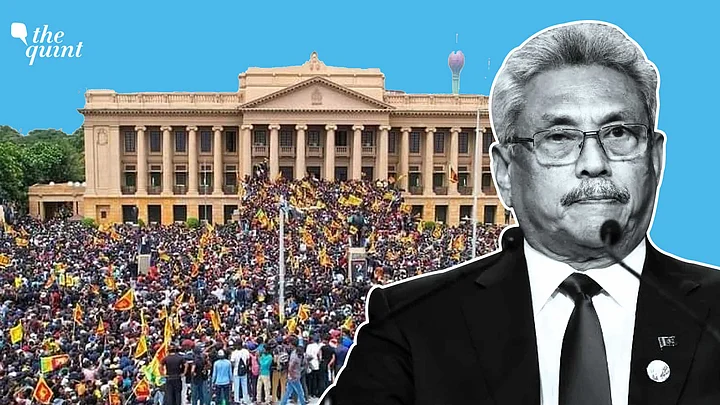Paris, 1789. On the eastern side lay a fortress, a prison of sorts used by the monarchs of France. Formally known as the Bastille Saint-Antoine, the Bastille had come to symbolise the king's tyrannical rule.
Then it was stormed.
The actions of the mob, which had assembled at the Bastille not to free prisoners, but to get ammunition and arms, went on to become one of the most, if not the most, defining moments of the French Revolution. After all, 14 July is celebrated as French National Day every year, also known as 'Bastille Day.'
Now fast forward 233 years and shift the gaze thousands of miles eastwards: Sri Lanka may have had its own Bastille moment on 9 July 2022. Of course, we don't know yet whether the storming of President Gotabaya Rajapaksa's house will have a similar revolutionary impact, but the protests of the day have definitely changed the near future of Sri Lankan politics.
The Build-Up to 9 July
We already know why Sri Lanka is facing its worst economic crisis since its independence from British rule in 1948.
The main cause is the shortage of foreign currency, which has led to a huge reduction in imports of essential items like petroleum, food, paper, sugar, lentils, medicines, and transportation equipment. You can read more about that here.
The crisis had been looming for quite a while but protests erupted in mid-March among motorists lined up for fuel. And Sri Lanka has been burning ever since.
A part of the people's anger can be sourced to the government's order on 27 June that halted all petrol sales except for essential services.
On the same day, residents of Galle, who had been waiting in long queues to get LPG gas cylinders surrounded the city's cricket stadium in protest. They said that they won't leave before they are provided with the cylinders that they desperately need. The police and army, however, eventually removed the protesters.
The most recent protests, that are part of what I will take the liberty of calling the "July crisis," were catalysed by the arrest of former MP Hirunika Premachandra of the United National Party.
The protests that were triggered by her arrest were met with brute force, including tear gas attacks by the police.
Just two days later, on 8 July, IGP Chandana Wickremesinghe declared a "police curfew," which, according to most legal experts, had absolutely no legal basis. Even the Bar Association of Sri Lanka wrote in its statement that the curfew was "illegal" and "intended to stifle freedom of expression and dissent."
The curfew was removed the next day, 9 July, by the IGP. That was, however, too small a concession to abate the anger of the people. The march to the president's house had begun.
9 July: The Storming of Gota's House
Undaunted by the suspensions on fuel distributions, huge groups of protesters traveled from far away places using a variety of means to gather at Chatham Street, Colombo, near President Gotabaya Rajapaksa's house, demanding his immediate resignation.
Surreal images and videos of thousands of protesters surrounding the president's residence emerged on social media.
They charged through police barriers and stormed the president’s residence, flooding the grand staircase, screaming for Gotabaya to resign.
In extraordinary scenes, the protesters went on a rampage throughout the house. While some jumped into his swimming pool, others took out what seemed like alcohol from the shelves and started chugging.
You can watch The Quint's compilation of the five most shocking videos of the day here.
Protesters could also be seen cooking in the president's kitchen, relaxing on his beds and sofas, and in another bizarre video, exercising and jogging in his private gymnasium.
A 50-year-old man protester named Rajith expressed his shock to The Guardian upon entering the president's home. "We saw their luxury rooms, their AC, their cooking gas. They even have so many pedigree pets," he said.
Gotabaya Rajapaksa, aided by the military, had reportedly fled the previous night, and has remained in hiding since the storming of his house.
More importantly, he finally announced that he would resign.
"It's a historic moment in Sri Lankan politics to have large numbers of citizens, activists, politicians, storm into the presidential secretariat and demand the resignation of the Sri Lankan president," Dilrukshi Handunnetti told The Quint.
The Impact: PM Resigns, President to Resign
"President Gotabaya Rajapaksa has officially informed Prime Minister Ranil Wickremesinghe that he will be resigning as previously announced," a statement from the Prime Minister's Office officially confirmed on Monday.
Reports of the same had already emerged on the night of 9 July, after the storming of Gotabaya's house.
The day also saw the resignation of Prime Minister Ranil Wickremesinghe, whose house was later burnt by protesters. At the same time, the Sri Lanka Police, along with the Police's Special Task Force, violently beat up many protesters, including journalists.
While Wickremesinghe expressed regret over the violence, Opposition parties said on Sunday, 10 July, that they would form an interim coalition government until the next parliamentary elections.
Regardless of who gets the top job within the interim government and after the next elections, the fall of the current regime will have huge implications. It is reminiscent of Hosni Mubarak's ouster in Egypt during the peak of the Arab Springs.
The 2011 Egyptian Revolution, which was caused due to widespread and persistent socio-economic grievances and police brutality, showed the extent to which the power of the people can topple a dictatorial government.
And in Sri Lanka, we are witnessing just that. What happens, next, however, given that the economy is still broken and the people are very angry, is something that one should not predict too confidently.
